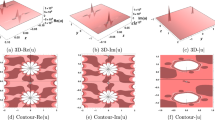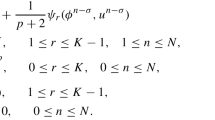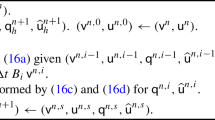Abstract
In the current research, we analyze dissipation and dispersion characteristics of the most accurate two and three-stage Gauss–Legendre implicit Runge–Kutta (R-K) methods. These methods, known for their A-stability and high stage order, are observed to carry minimum dissipation error along with the highest possible dispersive order in their respective classes. Investigation reveals that these schemes are inherently optimized to carry low phase error only at small wavenumber. It is noticed that a unique scheme, although usually sought, might not be best across diverse temporal step sizes. As larger temporal step size is imperative in conjunction with implicit R-K methods for physical problems, we thoroughly investigate to derive a class of minimum dissipation and optimally low dispersion implicit R-K schemes. Schemes are obtained by cutting down amplification error and maximum reduction of weighted phase error, suggest better accuracy for relatively bigger and varied CFL numbers. A potentially generalizable algorithm is used to design stable implicit R-K methods. As the work focuses on two and three-stage schemes, a comprehensive comparison using numerical test cases document only modest gain in accuracy or efficiency over Gauss methods.
















Similar content being viewed by others
Data Availability
The data sets generated during the current study are available from the corresponding author on reasonable request.
References
Butcher, J.: Numerical Methods for Ordinary Differential Equations, 2nd edn. Wiley, New York (2008)
Alexander, R.: Diagonally implicit Runge–Kutta methods for stiff O.D.E.’s. SIAM J. Numer. Anal. 14, 1006–1021 (1977)
Tam, C.K.W., Webb, J.C.: Dispersion-Relation-Preserving finite difference schemes for computational acoustics. J. Comput. Phys. 107, 262–281 (1993)
An, Y.: Finite-difference methods for second-order wave equations with reduced dispersion errors, Ph.D. Thesis, University of Washington (2015)
Simos, T.E.: Runge–Kutta interpolants with minimal phase-lag. Comput. Math. Appl. 8, 43–49 (1993)
Hu, F.Q., Hussaini, M.Y., Manthey, J.L.: Low-dissipation and low-dispersion Runge–Kutta schemes for computational acoustics. J. Comput. Phys. 124, 177–191 (1996)
Calvo, M., Franco, J.M., Rández, L.: Minimum storage Runge–Kutta schemes for computational acoustics. Comput. Math. Appl. 45, 535–545 (2003)
Bogey, C., Bailly, C.: A family of low dispersive and low dissipative explicit schemes for flow and noise computations. J. Comput. Phys. 194, 194–214 (2004)
Berland, J., Bogey, C., Bailly, C.: Low-dissipation and low-dispersion fourth-order Runge–Kutta algorithm. Comput. Fluids 35, 1459–1463 (2006)
Anastassi, Z.A., Simos, T.E.: An optimized Runge–Kutta method for the solution of orbital problems. J. Comput. Appl. Math. 175, 1–9 (2005)
Tselios, K., Simos, T.E.: Runge–Kutta methods with minimal dispersion and dissipation for problems arising from computational acoustics. J. Comput. Appl. Math. 175, 173–181 (2005)
Franco, J.M., Gómez, I., Rández, L.: SDIRK methods for stiff ODEs with oscillating solutions. J. Comput. Appl. Math. 81, 197–209 (1997)
Najafi-Yazdi, A., Mongeau, L.: A low-dispersion and low-dissipation implicit Runge–Kutta scheme. J. Comput. Phys. 233, 315–323 (2013)
Nazari, F., Mohammadian, A., Charron, M., Zadra, A.: Optimal high-order diagonally-implicit Runge–Kutta schemes for nonlinear diffusive systems on atmospheric boundary layer. J. Comput. Phys. 271, 118–130 (2014)
Nazari, F., Mohammadian, A., Charron, M.: High-order low-dissipation low-dispersion diagonally implicit Runge–Kutta schemes. J. Comput. Phys. 286, 38–48 (2015)
Giri, S., Sen, S.: A new class of diagonally implicit Runge–Kutta methods with zero dissipation and minimized dispersion error. J. Comput. Appl. Math. 376, 112841 (2020)
Ferracina, L., Spijker, M.N.: Strong stability of singly-diagonally-implicit Runge–Kutta methods. Appl. Numer. Math. 58, 1675–1686 (2008)
Pazner, W., Persson, P.-O.: Stage-parallel fully implicit Runge–Kutta solvers for discontinuous Galerkin fluid simulations. J. Comput. Phys. 335, 700–717 (2017)
Bhaumik, S., Sengupta, S., Sengupta, A.: Wave properties of fourth-order fully implicit Runge–Kutta time integration schemes. Comput. Fluids 81, 110–121 (2013)
Trefethen, L.N.: Group velocity in finite difference schemes. SIAM Rev. 24, 113–136 (1982)
Trefethen, L.N.: Finite difference and spectral methods for ordinary and partial differential equations, unpublished text (1996). http://people.maths.ox.ac.uk/trefethen/pdetext.html
Haras, Z., Ta’asan, S.: Finite difference scheme for long-time integration. J. Comput. Phys. 114, 265–279 (1994)
Aubin, J.-P., Frankowska, H.: Set-Valued Analysis. Birkhäuser, Basel (1990)
dit Sandretto, J.A., Chapoutot, A.: Validated explicit and implicit Runge–Kutta methods. Reliab. Comput. 22 (2016)
Sengupta, T.K., Dipankar, A., Sagaut, P.: Error dynamics: beyond von Neumann analysis. J. Comput. Phys. 226, 1211–1218 (2007)
Rajpoot, M.K., Sengupta, T.K., Dutt, P.K.: Optimal time advancing dispersion relation preserving schemes. J. Comput. Phys. 229, 3623–3651 (2010)
Lele, S.K.: Compact finite difference schemes with spectral-like resolution. J. Comput. Phys. 103, 16–42 (1992)
Rang, J.: Design of DIRK Schemes for Solving the Navier–Stokes-Equations, Informatik-Bericht 2007–02. TU Braunschweig, Braunschweig (2007)
Peles, O., Turkel, E.: Adaptive time steps for compressible flows based on dual-time stepping and a RK/implicit smoother. J. Sci. Comput. 81, 1409–1428 (2019)
Lis: Library of Iterative Solvers for Linear Systems (2017). https://www.ssisc.org/lis/
Franco, J.M., Gómez, I.: Fourth-order symmetric DIRK methods for periodic stiff problems. Numer. Algorithms 32, 317–336 (2003)
Van Der Houwen, P.J., Sommeijer, B.P.: Explicit Runge–Kutta (-Nyström) methods with reduced phase errors for computing oscillating solutions. SIAM J. Numer. Anal. 24, 595–617 (1987)
Ixaru, L.G., Vanden Berghe, G.: Exponential Fitting. Springer, Berlin (2004)
Jameson, L.: High order schemes for resolving waves: number of points per wavelength. J. Sci. Comput. 15, 417–439 (2000)
Lyon, M., Bruno, O.P.: High-order unconditionally stable FC-AD solvers for general smooth domains II. Elliptic, parabolic and hyperbolic PDEs; theoretical considerations. J. Comput. Phys. 229, 3358–3381 (2010)
Acknowledgements
The authors are thankful to the anonymous reviewers for their fruitful suggestions. These suggestions have enhanced the quality of the manuscript. The authors are thankful to Dr. Anjan K. Chakrabarty, Department of Mathematics, Indian Institute of Technology Guwahati, India for some intense discussions. Authors acknowledge the use of facilities at the High-Performance Computing Centre, Tezpur University sponsored by DeitY, India in collaboration with C-DAC, India. The first author is supported by University Grant Commission, India under Rajiv Gandhi National Fellowship (F1\(-\)17.1/2015-16/RGNF-2015-17-SC-WES-12451). The second author is thankful to Science & Engineering Research Board, India for assistance under Mathematical Research Impact Centric Support (File Number: MTR/2017/000038).
Author information
Authors and Affiliations
Corresponding author
Ethics declarations
Conflict of interest
The authors have no conflict of interest to declare that are relevant to the content of this article.
Additional information
Publisher's Note
Springer Nature remains neutral with regard to jurisdictional claims in published maps and institutional affiliations.
Rights and permissions
Springer Nature or its licensor (e.g. a society or other partner) holds exclusive rights to this article under a publishing agreement with the author(s) or other rightsholder(s); author self-archiving of the accepted manuscript version of this article is solely governed by the terms of such publishing agreement and applicable law.
About this article
Cite this article
Giri, S., Sen, S. Phase Error Analysis of Implicit Runge–Kutta Methods: New Classes of Minimal Dissipation Low Dispersion High Order Schemes. J Sci Comput 96, 9 (2023). https://doi.org/10.1007/s10915-023-02220-7
Received:
Revised:
Accepted:
Published:
DOI: https://doi.org/10.1007/s10915-023-02220-7
Keywords
- Implicit Runge–Kutta method
- Wave propagation
- Minimal dissipation
- Low dispersion
- Temporal integration
- Computational acoustics




